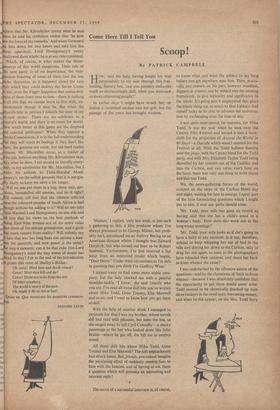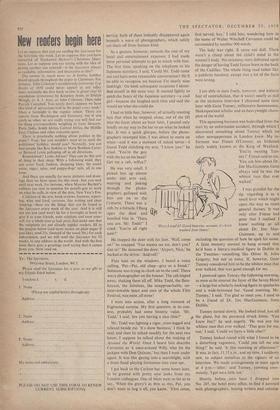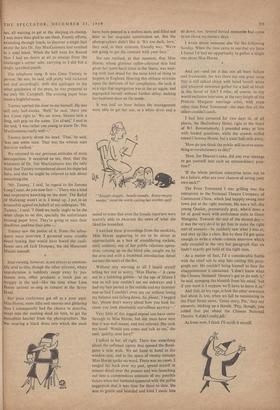Come Here Till I Tell You
Scoop!
By PATRICK CAMPBELL
How,' said the lady, having fought her way purposefully to my side through this fre,p- loading, literary bee, 'can you possibly make. U' result so excruciatingly dull, when you interview ,
so many interesting people?' .
In earlier days 1 might have struck her, or slotted a varnished sardine into her gob, but the passage of the years has brought wisdom.
`Madam,' I replied, 'only last week, at just such a gathering as this, a film producer whom I've always presumed to be George Minter, but prob- ably isn't, introduced me as Aubrey Baring to an American director whom I thought was Edward Dmytryk, but who turned out later to be Robert Siodmak. Furthermore, I've just received a fan letter from an interested reader which begins, "Dear Doris." Under these circumstances I'm safe in guessing that you think I'm Godfrey Winn.'
I turned away to find some more stable com- pany, but the lady blocked me with a painful shoulder-tackle. `I know,' she said 'exactly who you are. I've read all those dull bits you've written about Mike Todd, Gene Tunney, Elsa Maxwell and so on, and 1 want to know how you get them so dull.'
With the help of another drink I managed to persuade her that I was my brother, whose novels she had read with pleasure, but none the less, as she surged away to 'tell Cyril Connolly'—a stocky personage at the bar who looked more like John Braine—where he got off, she left me in sombre mood.
All those dull bits about Mike Todd, Gene Tunney and Elsa Maxwell? The soft impeachment had struck home. But, friends, you cannot imagine the paralysing effect of suddenly coming face to face with the famous, and of having to ask them a question which will provoke an interesting and relevant reply!
The secret of a successful interview is, of course, to know what you want the subject to say long before you get anywhere near him. Then, practi- cally any remark on his part, however mindless, flippant.or evasive, can be welded into the existing framework, to give topicality and significance to the whole. It's going into it unprepared that glues the whole thing up, so much so that I always find myself lucky to be able to advance the conversa- tion by exchanging even the time of day.
I was quite unprepared, for instance, for Mike Todd. It was the year when he took over the Cannes Film Festival and turned it into a back- cloth for the projection of Around the World in 80 Days—a charade which wasn't entered for the Festival at all. With the Todd balloon floating over the plage, with the Casino hired for the Todd party, and with Mrs. Elizabeth Taylor Todd being shovelled by her consort out of the Cadillac and into the Carlton, and vice versa, every hour on the hour, there was only one thing to write about and that was Todd.
We, the news-gathering forces of the world, camped on the steps of the Carlton Hotel day and night, waiting for him to emerge. I spent part of the time formulating questions which I might put to him, if ever our paths should cross.
`Mr. Todd, your wife has gone on record as having said that she has a child's mind in a woman's body. How does this work out in the long winter evenings?'
`Mr. Todd, your wife looks as if she's going to have a baby at any moment. Is it not, therefore, unkind to keep whipping her out of bed in the villa and driving her down to the Canton, only to drag her out again, as soon as the photographers have reloaded their cameras, and shoot her back to from whence she came'?'
I was undisturbed by the offensive nature of the questions—and by the clumsiness of `back to from whence'—because I was absolutely confident that the opportunity to put them would never arise. Todd seemed to be chronically shacked up with three bankers in the royal suite, borrowing money, and when he did appear, on the Mrs. Todd ferry service, both of them instantly disappeared again beneath a wave of photographers, which safely cut them off from human kind.
As a gesture, however, towards the cost of my hotel and entertainment expenses, I had made three personal attempts to get in touch with him. The first time, speaking on the telephone to his Japanese secretary, I said, 'Could Mr. Todd come out and haVe some reasonable conversation? He'll be able to recognise me because I'm nearly nine feet I had so little fear, however, of actually meeting him that when he stepped, alone, out of the lift into the foyer about an hour later, I paused only briefly on my way to the bar to see what he looked like. It was a quick glimpse, before the photo- graphers swamped him. I was about to move on when—and it was a moment of naked terror-1 found Todd clutching my arm. 'I know you!' he cried. 'You're the guy with the ice on his head! Get me a cab, willya?' He was very sMall. I picked him up almost under one arm and, weaving and jinking through the photo- graphers, galloped with him out on to the Croisette. There was a cab, by a miracle. I flung open the door and bundled him in. 'There you are, Mr. Todd!' I cried. 'You're all right now!' He stopped the door with his foot. 'Well, come on!' he snapped. 'You wanna see me, don't you? Get in!' He slammed the door. 'Airport, Nice,' he barked at the driver. 'And roll!' Fists beat on the windows. I heard a voice calling, 'Pat—Pat, old chap—give us a break!' Someone was trying to climb on to the roof. There was a photographer on the bonnet. The cab leaped away, shaking them all off. Mike Todd, the flam- boyant, the fabulous, the unapproachable, un- interviewable heart and core of the whole Film Festival, was mine, all mine! I went into action, after a long moment of frightened surmise. My first question, in its con- text, probably had some historic value. 'Mr. Todd,' I said, 'are you having a nice time?' • Mr. Todd was lighting a cigar, cross-legged and relaxed beside me. 'It's show business,' I think he said, and then he talked steadily for the next two hours. I suppose he talked about the making of Around the World. Once I heard him describe Cervantes as 'a once-around Willy who hit the jackpot with Don Quixote,' but then I went under again. It was like gazing into a searchlight, with a brass band playing fortissimo into your ear. I got back to the Carlton bar some hours later, to be greeted with pretty sour looks from my London colleagues. One of them went so far as to say, 'When the gravy's as thin as this, Pat, you don't want to hog it all, you know.' 'First come, first served, boy,' I told him, wondering how in the name of Walter Winchell Cervantes could be surrounded by another 900 words. The lady was right. It came out dull. There wasn't a cheep about the child's mind in the woman's body. No strictures were delivered upon the danger of having Todd Junior born in the back of the Cadillac. The whole thing read rather like a publicity handout, except that a lot of the facts were wrong. I am able to state freely, however, and without fear of contradiction, that it wasn't nearly as dull as the exclusive interview I obtained some time later with Gene Tunney, millionaire businessman, Shakespearean scholar and ex-heavyweight cham- pion of the world. This agonising business was bedevilled from the start by an unfortunate accident, through which I discovered something about Tunney which no other newspaperman in London knew. My in- formant was Fintan O'Connor, an Irishman 'Hare I read it? Good heavens, woman, it's been washed four times.' . I pounced upon Tunney the following morning, as soon as he entered the foyer of the Savoy Hotel —a large but scholarly-looking figure in spectacles and a wide-brimmed hat. 'Good morning, Mr. Tunney,' I said. 'I'm glad to meet you. I used to be a friend of Dr. Jim MacGuinness, from Dublin.' Tunney turned slowly. He looked tired, ).ist off the plane, but the password struck home. 'You knew Jim?' he said eagerly. 'He was just the whitest man that ever walked.' That goes for me, too,' I said. 'Could we have a little chat?' Tunney looked round with what I found to be a disturbing vagueness. 'Could you tell me one thing?' he said. 'Is this morning or afternoon?' It was, in fact, 11.15 a.m., and no time, I suddenly saw, to subject ourselves to the rigours of an interview. We made arrangements to meet again at 4 p.m.—`after,' said Tunney, yawning enor- mously, 'I got me a little rest.' Shortly before zero hour I dropped into No. 205, the hotel press office, to find it jammed with photographers, boxing writers and column- ists, all wanting to get at the sleeping ex-champ. I was more than glad to see them. Frantic efforts, extending through lunch, to discover a single fact about the late Dr. Jim MacGuinness had resulted in a total blank. When the bell went for Round One I had no desire at all to emerge from the challenger's corner solo, carrying as I did but a single, spavined punch. The telephone rang. It was Gene Tunney in person. He was, he said, still pretty well tuckered out and accordingly, with due apologies to the other gentlemen of the press, he was prepared to see only Mr. Campbell. The evening paper boys made a frightful scene. • Tunney opened the door to me himself. He was still only half-awake. 'Well,' he said, 'there you are. Come right in.' We sat down. Silence took a long, soft grip on the scene. 'I'm afraid,' I said in the end, '1 was rather too young to know Dr. Jim M acG uinness really well—.' Tunney slowly shook his head. 'That,' he said, 'was one white man. That was the whitest man that ever walked.' We returned to our previous attitudes of mute introspection. It occurred to me, then, that the Whiteness Of Dr. Jim MacGuinness was the only think that Tunney remembered about his departed hero, and that he might be relieved to talk about something else. `Mr. Tunney,' I said, in regard to the famous Long Count, do you now feel—.' There was a loud and imperative knocking on the door. The Relief of Mafeking wasn't in it. 1 stood up. I put in an irresistible appeal on behalf of my colleagues. 'Mr. Tunney,' I said, 'I think we really ought to let the other chaps in on this, specially the unfortunate evening paper boys. They're going to miss their deadlines, and lose their jobs—.' Tunney saw the justice of it. From the subse- quent mass interview I garnered some crumbs about boxing that would have bored the cauli- flower ears off Jack Dempsey, the old Manassah Mauler himself. Interviewing, however, is not always as emotion- ally arid as this, though tlic other extreme, where apprehension is suddenly swept away by pas- sionate love, often produces a result just as scrappy in the end—like the time when Lena Horne arrived to sing in cabaret at the Savoy Hotel. Her press conference got off to a poor start. Miss Horne, more lithe and sinuous and glittering than I subsequently had the chance to describe, swept into the meeting dead on time, to get the Immediate hatchet from the photographers. She Was wearing a black dress into which she must have been poured in a molten state, and filled out later as her exquisite constitution set. But the photographers didn't like it. 'It's too dark, love,' they said, in their intimate, friendly way. 'We're not going to get the contrast with your face.' No one realised, at that moment, that Miss Horne, whose glorious coffee-coloured skin had given her some hard times in the States, was wait- ing with taut dread for the same kind of thing to happen in England. Hearing this oblique stricture upon the darkness of her complexion, she took it as a sign that segregation was in the air again. and segregated herself without further delay, locking her bedroom door on the inside. It was half an hour before the management were able to get her out, in a white dress and a "Sniggle-shaggle, bundle-nundle, flopsy-mopsy pledge," cried the witch, casting her terrible spell' mood so tense that even the female reporters were scarcely able to excavate the news of what she liked for breakfast. I watched these proceedings from the outskirts, Miss Horne appearing to me to be about as approachable as a box of smouldering rockets, until suddenly one of her public relations opera- tives, coming up on the blind side, caught me by the arm and with a mumbled introduction thrust me into the heart of the tire. Without any warning at all 1 heard myself telling her not to worry. 'Miss Horne-2 it came out in a bubbling gabble—`at the age of fifteen I was so tall you couldn't see me sideways and I had my hair parted in the middle and my stammer was so had I couldn't even say cat without losing my balance and falling down. So, please,' I begged her, 'please don't worry about how you look be- cause you look absolutely marvellous anyway—.' Very little of this jagged exposé can have come through to Miss Horne, but she must have seen that it was well meant, and was relieved. She took my hand. 'Would you come and talk to me,' she said, 'quietly, over here?' I talked to her, all right. There was something about the softened tigress that opened the flood- gates a mile wide. We sat hand in hand in the window-seat, and in the space of twenty minutes Miss Horne spoke no word. There was no room. 1 ranged far back over my past, spread myself in minute detail over the present and was launching out into a compendious estimate of my possible future when her husband appeared with the polite suggestion that it was time for them to dine. He was so gentle and bearded and kind I made him sit down, too. Several buried memories had come to me about my nursery days. I wrote about someone else for the following Sunday. When the time came to marshal my facts I found I'd had no opportunity to gather a single one about Miss Horne. And yet--and yet it has not all been failure and frustration, for was there not one great coup that is still talked about with bated breath when and wherever newsmen gather for a half of bitter iiithe Street of Ink? 1 refer, of course, to my world-exclusive interview, at the very height of the Princess Margaret marriage crisis, with none other than Peter Townsend—the man that all the others couldn't catch. I had him cornered for two days in, of all places, the Shaftesbury Hotel, right in the heart of WI. Remorselessly, I pounded away at him with loaded questions, while the crowds milled round Clarence House, but a scant half-mile away. 'How do you think the public will receive some- thing as revolutionary as this?' 'How, for Heaven's sake, did you ever manage to get yourself into such an extraordinary posi- tion?' `If the whole perilous enterprise turns out to be a failure, what are your chances of saving your own neck?' The Peter Townsend I was grilling was the interpreter to the National Theatre Company of Communist China, which had happily swung into town just at the right moment. He was a tall, shy young Quaker, prematurely grey, who'd done a lot of good work with ambulance units in Outer Mongolia. Towards the end of the second day— it was the very devil to get him to make the right sort of answers—he suddenly saw what 1 was at, and shut up like a clam. But by then I'd got quite enough to write a whole column interview which only revealed in the very last paragraph that we hadn't exactly got hold of the right man. As a matter of fact, I'd a considerable battle with the chief sub to stop him cutting this para- graph out. He couldn't bring himself to face the disappointment it contained. 'I don't know what the Chinese National Theatre's got to do with it,' he said, sponging the blemish from his mind, 'but if you want it I suppose we'll have to leave it in.' And that, to my rage, is how the other newsmen feel about it, too, when we fall to reminiscing in the Fleet Street stews. 'Great story, Pat,' they say sincerely, sticking up a thumb. 'Pity, though, you added that par about the Chinese National Theatre. It didn't really jell.' As from now, 1 think I'll scrub it myself.




























 Previous page
Previous page